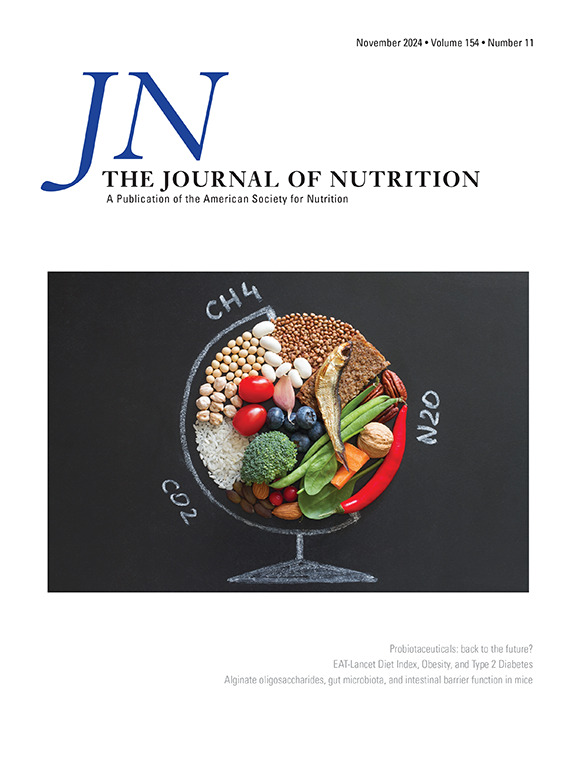膳食多酚摄入量与整体和部位特异性癌症的风险:基于日本公共卫生中心的前瞻性研究
IF 3.7
3区 医学
Q2 NUTRITION & DIETETICS
引用次数: 0
摘要
背景:多酚可能通过广泛的特性,包括抗氧化和抗炎,在致癌过程中发挥保护作用。然而,在亚洲人群中,膳食多酚总摄入量与癌症风险之间的关联证据有限。目的:这项基于人群的前瞻性研究旨在调查多酚摄入量与日本人整体和部位特异性癌症风险之间的关系。方法:在日本公共卫生中心(JPHC)前瞻性研究中,参与者为41907名男性和48268名女性,年龄45-74岁,既往无癌症诊断。在1995年至1998年期间,通过一份包含147个项目的食物频率问卷来估计膳食中多酚的摄入量。参与者根据总多酚摄入量和不含高多酚饮料(茶、咖啡和酒精饮料)的食物中多酚的摄入量被分为五分之一(Q)。使用Cox比例风险回归模型对潜在混杂因素进行校正,估计癌症风险的风险比(hr)和95%置信区间(CIs)。结果:在平均15.8年的随访期间,确定了12,970例癌症病例(7,999例男性和4,971例女性)。我们没有观察到总体癌症风险降低与多酚摄入之间的关联。对于部位特异性癌症,与最低五分位数(Q1)相比,较高的总多酚摄入量与男性较低的肝癌风险相关(HRQ4=0.67, 95% CI=0.51-0.89;HRQ5=0.66, 95% CI=0.48-0.89, p-trend=0.003)和女性(HRQ5=0.63, 95% CI=0.39-1.02, p-trend=0.003),而从不包括茶、咖啡和酒精饮料的食物中摄入更多的多酚与男性患结肠癌的风险较低相关(HRQ4=0.73, 95% CI=0.58-0.92;HRQ5=0.72, 95% CI=0.54 ~ 0.96, p-trend=0.07)。结论:目前的研究结果并不支持膳食多酚在整体癌症预防中的实质性作用。总多酚可以降低患肝癌的风险,而不包括茶、咖啡和酒精饮料在内的食物中的多酚可以降低患结肠癌的风险。本文章由计算机程序翻译,如有差异,请以英文原文为准。
Dietary Polyphenol Intake and Risk of Overall and Site-Specific Cancers: the Japan Public Health Center-based Prospective Study
Background
Polyphenols may play a protective role in carcinogenesis through a wide range of properties, including antioxidant and anti-inflammatory. However, evidence for the association between total dietary polyphenol intake and cancer risk in Asian populations is limited.
Objective
This population-based prospective study aimed to investigate the association between polyphenol intake and risk of overall and site-specific cancer among Japanese.
Methods
Participants were 41,907 men and 48,268 women aged 45–74 y with no previous cancer diagnosis in the Japan Public Health Center-based Prospective Study. Dietary polyphenol intake was estimated by a 147-item food frequency questionnaire administered in 1995–1998. Participants were divided into quintiles (Q) according to intakes of total polyphenol and polyphenol from foods, not including high-polyphenolic beverages (tea, coffee, and alcoholic beverages). Hazard ratios (HRs) and 95% confidence intervals (CIs) for cancer risk were estimated using Cox proportional hazard regression models adjusted for potential confounders.
Results
During a median of 15.8 y of follow-up, 12,970 incident cancer cases (7999 men and 4971 women) were identified. We did not observe associations of lower risk of overall cancer with polyphenol intake. For site-specific cancers, compared with the lowest quintile (Q1), higher total polyphenol intake was associated with a lower risk of liver cancer in men (HRQ4: 0.67; 95% CI: 0.51, 0.89, HRQ5: 0.66; 95% CI: 0.48, 0.89; P-trend = 0.003) and women (HRQ5: 0.63; 95% CI: 0.39, 1.02; P-trend = 0.003), whereas higher polyphenol intake from foods not including tea, coffee, and alcoholic beverages was associated with a lower risk of colon cancer in men (HRQ4: 0.73; 95% CI: 0.58, 0.92, HRQ5: 0.72; 95% CI: 0.54, 0.96; P-trend = 0.07).
Conclusions
The results of the present study do not support a substantial role for dietary polyphenols in overall cancer prevention. Total polyphenol may reduce the risk of liver cancer, and polyphenol from foods, not including tea, coffee, and alcoholic beverages, may reduce the risk of colon cancer.
求助全文
通过发布文献求助,成功后即可免费获取论文全文。
去求助
来源期刊

Journal of Nutrition
医学-营养学
CiteScore
7.60
自引率
4.80%
发文量
260
审稿时长
39 days
期刊介绍:
The Journal of Nutrition (JN/J Nutr) publishes peer-reviewed original research papers covering all aspects of experimental nutrition in humans and other animal species; special articles such as reviews and biographies of prominent nutrition scientists; and issues, opinions, and commentaries on controversial issues in nutrition. Supplements are frequently published to provide extended discussion of topics of special interest.
 求助内容:
求助内容: 应助结果提醒方式:
应助结果提醒方式:


